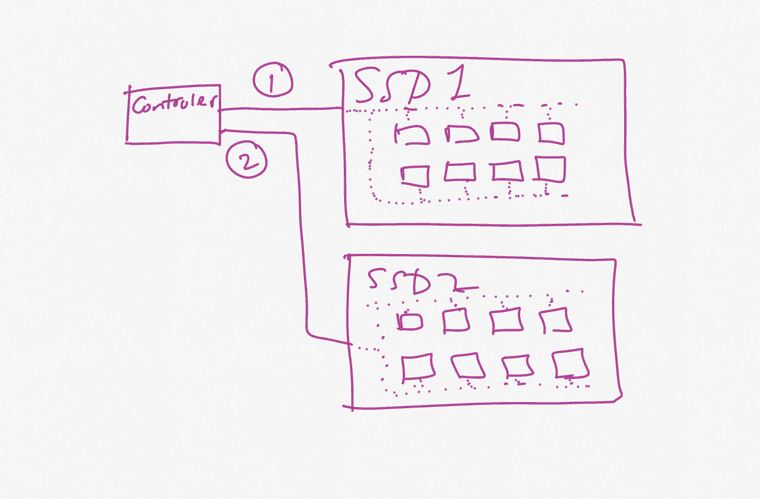The Apple M2 MacBook Pro is Crap
-
I don't buy it.
I readily admit that I am no expert on benchmarking, but I know enough about it to see that this guy knows even less than I do.
If you make a claim about SSD speed, why not measure that speed directly instead of that indirect messy way of apps using virtual memory?
Also, even if you want to quantify "real life difference", it is nonsense to use just one specific application.
Finally, the original argument doesn't make sense. A 128GB SSD doesn't necessarily have less "channels" than a 256 GB SSD.
-
I don't buy it.
I readily admit that I am no expert on benchmarking, but I know enough about it to see that this guy knows even less than I do.
If you make a claim about SSD speed, why not measure that speed directly instead of that indirect messy way of apps using virtual memory?
Also, even if you want to quantify "real life difference", it is nonsense to use just one specific application.
Finally, the original argument doesn't make sense. A 128GB SSD doesn't necessarily have less "channels" than a 256 GB SSD.
@Klaus said in The Apple M2 MacBook Pro is Crap:
I don't buy it.
I readily admit that I am no expert on benchmarking, but I know enough about it to see that this guy knows even less than I do.
If you make a claim about SSD speed, why not measure that speed directly instead of that indirect messy way of apps using virtual memory?
Also, even if you want to quantify "real life difference", it is nonsense to use just one specific application.
Finally, the original argument doesn't make sense. A 128GB SSD doesn't necessarily have less "channels" than a 256 GB SSD.
A winner weighs in. Thank you Klaus.
-
The criticism is valid. For the 256 GB model, Apple has chosen to use “one chip” rather “two chips”, thus depriving the “one chip” configuration from benefiting from RAID-0 like performance boost. It’s like comparing the performance of “one drive” with two RAID-0 configured drives. From inventory management perspective, it’s easier/cheaper for Apple to use one type of chip rather than two. The trade off is leaving some aspect of “performance” not fully optimized.
-
RAID-0?
I'm no expert on the matter, but while RAID-0 makes perfect sense for traditional hard drives, I'm not convinced it makes sense for SSDs.
An SSD is composed of multiple flash memory chips. "RAID-0"-like striping could be performed easily internally, among the chips, and maybe even among subdivisions of single chips.
If a 128GB SSD contains 8 flash memory components, a 256GB SSD might contain 16 of the same flash memory components. No matter whether you have 1x256 or 2x128, you get 16 chips, and can RAID-0 the hell out of those 16 chips.
-

This is how I see it: If you split the SSDs across two channels 1️⃣ and 2️⃣, the controller can RAID-0 over the two channels. Further parallelization within each SSD chip package cannot fully make up for the loss of parallelization at the controller level. If you put the entire SSD capacity on “one chip” and connect it to channel 1️⃣, you leave channel 2️⃣ unused and leave some potential for parallelization boost on the table.
-
Looks like SSDs do indeed "RAID-0" internally, to some degree.
From Wikipedia:
The performance of an SSD can scale with the number of parallel NAND flash chips used in the device.
and
Micron and Intel initially made faster SSDs by implementing data striping (similar to RAID 0) and interleaving in their architecture.
Whether your argument works, Ax, depends on where the bottleneck is (is a single channel a bottleneck?), and how those SSDs are structured internally.
For instance, it doesn't matter if I plug my mouse and my keyboard into two separate USB ports, or use just one port via a USB hub, since the channel is not a bottleneck.
In any case, I do think it is wrong to assume, generally, that a RAID-0 of two 128GB SSDs will always be faster than a single 256GB SSD. Maybe it is true in that specific M2 MB Pro case, though.
-
For $1300 you get 8 GB of RAM and a 256SSD?
Sign me up!
-
For $1300 you get 8 GB of RAM and a 256SSD?
Sign me up!
@Doctor-Phibes said in The Apple M2 MacBook Pro is Crap:
For $1300 you get 8 GB of RAM and a 256SSD?
Sign me up!
I just checked - a Thinkpad X13 at the same price level also has 8GB RAM and 256GB SSD. The price isn't that outrageous. The thing that is silly at Apple is how much they charge for upgrades to RAM or SSD.
-
Tried a PC with significantly better specs. Sucked. Could NOT render video files to save its life.
Have a Mac now. Works.